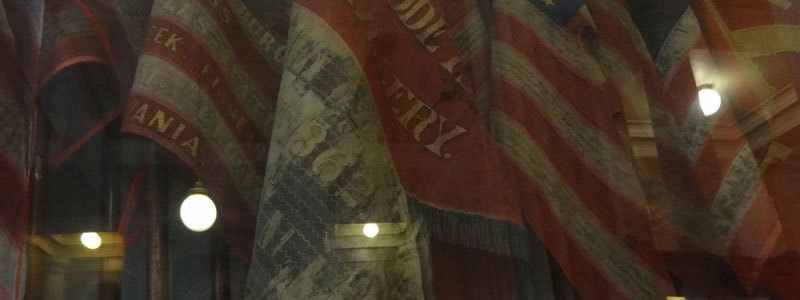Let’s Not Overdo the RI History Revisionism
Ever since Rhode Island Speaker of the House Nicholas Mattiello invited accusations of ignorance by questioning whether there had ever been slavery in the Ocean State, the pendulum has been swinging the other way. Although it seems unlikely, we can hope that Providence Inner City Arts Director Ali Cabral’s letter on GoLocalProv is the furthest-point of that swing:
The Bristol Rhode Island Independence Day Celebration is 236 years old this year. I am having a hard time comprehending that for almost 81 of those years, just one block away from Main Street, slave ships docked in Bristol’s harbor.
I wonder how did the Citizens of Bristol rationalize beating the drums of freedom one day, and beating into submission their human cargo the next?
Cabral doesn’t give any details, so it isn’t clear what moment he thinks marked the end of those beatings. The Bristol Independence Day parade began in 1785. Were Bristol residents handling human cargo up until the end of the Civil War? More specifically, were the same Bristolians beating drums for independence also beating slaves?
Here is one of the challenges in responding to modern day revisionism. In the fashion of Howard Zinn, progressives count it as proof of their version of history if they can find any evidence for their claims at all. The burden then falls on those who would disagree to prove that there was not a single case of a particular activity.
Even where such a thing might be possible, most people in common discussion are unlikely to do the thorough research to satisfy themselves that there’s not some hidden anecdote lying in wait to spring forth as proof of their ignorance. Thus, extreme assertions manage to stand, because reasonable responses cannot be as extreme. This is why we used to be (and ought to be again) content with some level of generalities. Put aside the special and/or difficult cases; can one really assert that the people of Rhode Island and Providence Plantations were hypocrites for celebrating independence prior to the 1860s… or even to this day?
A test case for that question can be found on the Rhode Island page of historian Douglas Harper’s website, Slavery in the North.
During the Revolution, Quaker abolitionists and the powerful Newport shipping interest clashed over slavery. In February 1784 the Legislature passed a compromise measure for gradual emancipation. All children of slaves born after March 1 were to be “apprentices,” the girls to become free at 18, the boys at 21. As with other Northern instances of gradual emancipation, this gave slaveowners many years of service to recoup the cost of raising the children.
No slaves were emancipated outright. The 1800 census listed 384 slaves, and the number fell gradually to 5 in 1840, after which slaves were no longer counted in the censuses for the state. And, in an essential element of the 1784 compromise, the right of Rhode Island ship-owners to participate in the foreign slave trade was undisturbed.
Legislation against slave-trading proved difficult to enforce in Rhode Island. John Brown, a merchant, state representative, and powerful slaveholder, was tried in 1796 for violating the federal Slave Trade Act of 1794, which prohibited ships destined to transport slaves to any foreign country from outfitting in American ports. He was found not guilty. The acquittal convinced many that the new legislation was useless against the wealthy and powerful. A year later, he saw his ship, the “Hope,” confiscated for violations.
Very clear in this passage is that slavery was a contentious issue in Rhode Island. Those tarring the state are lumping the Quakers in with the wealthy self-interests, like John Brown. Note, in particular, that Brown appears to have been targeted with legal and regulatory pressure. If you’re looking to characterize the state and people of Rhode Island as pro-slavery or pro-freedom back when the Bristol parade was still new, those doing the targeting by means of government would seem to have the stronger claim.
When it comes to the debate about changing the state’s name to eliminate the word, “plantations,” one can find fact-checking articles about the significance of the state’s full name’s appearance in the U.S. Constitution, but a related historical document is probably more relevant. In the late 1700s, the inchoate United States of America found it necessary to pressure Rhode Islanders actually to ratify the U.S. Constitution. When they finally did so, at the end of May 1790, the “Convention of the State of Rhode Island and Providence Plantations” presumed to request several amendments to the document, including this one:
As a traffic tending to establish or continue the slavery of any part of the human species is disgraceful to the cause of liberty and humanity, that Congress shall, as soon as may be, promote and establish such laws and regulations as may effectually prevent the importation of slaves of every description into the United States.
When acting “in the name and behalf of the people of the state,” Rhode Islanders sought the end of slavery in the America. This seems to be the ongoing theme of historical research, whatever exceptions there may be to prove the rule, and a reasonable person should find that it solidifies the claim of Rhode Islanders (including those from Bristol) to value freedom and independence.




